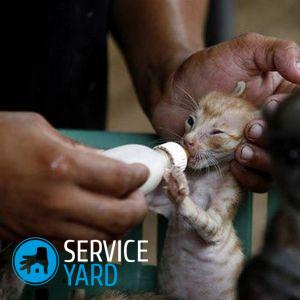The kitten has loose stools - what should I do?

Unfortunately, diarrhea in kittens is a frequent occurrence. Many people have a very young kitten. And in vivo, the baby departs from the mother much later. He is completely not adapted to independent life, and therefore is prone to diseases and infections. To be fully armed and not to harm your little pet, we’ll figure out if the kitten has loose stools, what to do and how to prevent this from happening in the future.
to contents ↑Causes
There are many reasons for a cat to have loose stools. Some problems do not require any intervention, others can be fixed independently. However, if diarrhea lasts several days, blood stains appear in the stool, the animal loses weight and refuses to feed - by running to the veterinarian. In no case should this problem be left to chance. So, why does a kitten have loose stools, what should I do?
Important! If the baby appeared in the house recently and began to vilify, this is natural. Most likely, the reason is a change in diet. It is necessary to give the animal a couple of days to get used to the new food and drinking regimen.
Often, a change in diet and a stressful situation does not provoke diarrhea, but constipation. In any case, the baby’s digestive system ceases to function normally.
Important! If within 2 days the condition of the animal does not return to normal, this is an occasion for a visit to the veterinarian.
In addition to the transition from cat's milk to unusual food, such reasons can also provoke diarrhea:
- Overeating. A kitten cannot control satiety and, in the full sense of the word, does not know the measure.
- Food allergy. Kittens are the same young children, and allergic reactions are not uncommon for them.
- A kitten can accidentally eat leftovers from the hosts table, accidentally thrown chewing gum. All of this can lead to digestive problems.
- Diarrhea can also occur in a kitten eating cat's milk if the mother cat suffers from helminthic invasion.
- Infectious disease. Infections such as viral peritonitis, calcevirosis, or cat distemper are manifested by stool disorders.
Signs:
- The main sign of diarrhea is a frequent loose stool in a kitten, with an extremely unpleasant odor.
- Sometimes impurities of blood and mucus appear in the feces of a kitten.
- The baby’s tummy is swollen, the animal becomes lethargic, refuses to feed.
- Often, vomiting is added to the symptoms.
to contents ↑Important! If the stool has acquired a black or blood-red color, this indicates internal bleeding. In this case, you can not hesitate. The kitten should be urgently shown to a specialist.
The kitten has loose stools - how to treat at home?
If a kitten once “went liquid” - this is not a cause for alarm:
- Diarrhea caused by changes in diet is treated with a temporary decrease in the total amount of food.
- Go out with a kitten for a walk? Be careful that the young does not try to eat leftovers lying on the ground. If a kitten suffers from allergies, allergen products should be excluded from the diet.
- Have your pet noticed loose stools? Put him on a “starvation diet": for half a day do not give any food. But the access to water at the young animal should be constant. This will help prevent dehydration.
to contents ↑Important! Many not very experienced owners ask the question: is it possible to give medicine to an animal without consulting a specialist? Effective and, at the same time, safe drugs are Enterosgel and Smecta. These drugs are classified as sorbents and help to cope with intoxication.
Diarrhea kitten diarrhea
When the kitten improves, the next day you can give him a little boiled rice and three-day kefir. The next day, please the beast with boiled chicken breast. The diet should be expanded gradually. Even if the pet has recovered, show it to the doctor. He will prescribe maintenance therapy, possibly prescribing probiotics.
to contents ↑When should I contact a specialist immediately?
- If you clearly see that the general condition of the baby is suffering, contact your veterinarian. It is advisable to call a doctor at home, because in the clinic the animal can catch an infection from other animals. The kitten is already unwell, his immunity is weakened, so a new test for his immune system is not necessary.
- If you suspect poisoning, you can not self-medicate, show the kitten to the veterinarian. A timely gastric lavage will save the baby's life.
- In case of defeat by worms, treatment with specially selected medications will help the animal. Moreover, treatment should be carried out under the supervision of a specialist
Stock footage
All more or less prolonged problems with the stool should be solved with the veterinarian. The doctor will conduct the necessary tests and prescribe the right treatment strategy.
- How to choose a vacuum cleaner taking into account the characteristics of the house and coatings?
- What to look for when choosing a water delivery
- How to quickly create comfort at home - tips for housewives
- How to choose the perfect TV - useful tips
- What to look for when choosing blinds
- What should be running shoes?
- What useful things can you buy in a hardware store
- Iphone 11 pro max review
- Than iPhone is better than Android smartphones



